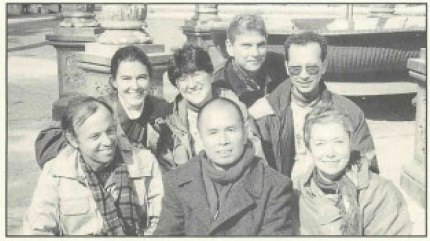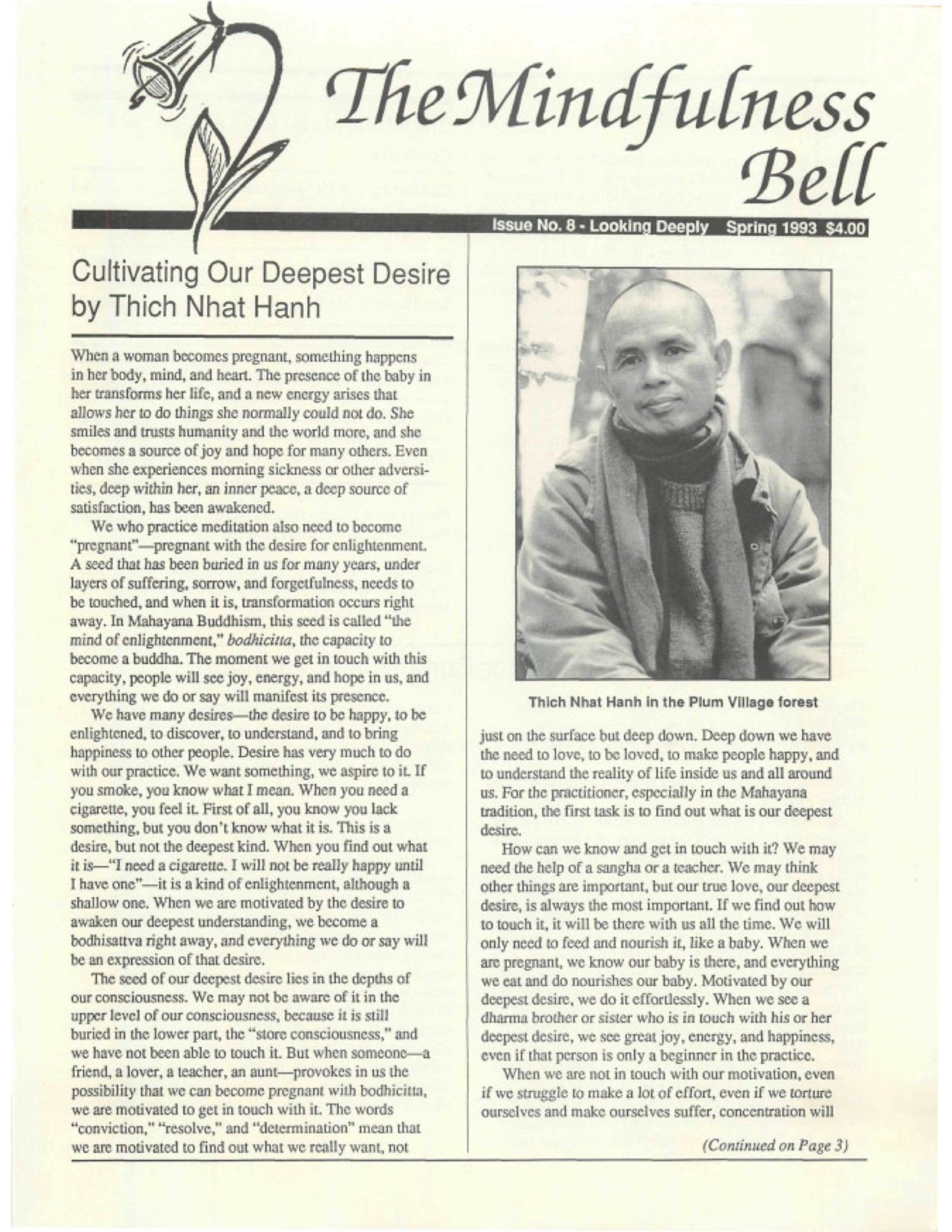By Therese Fitzgerald
Six of us met at the Paris airport—Thay, Sister True Emptiness, Pierre Marchand, Daniel Reeves, Arnie Kotler, and myself—and after a brief three-hour flight, we landed behind the “Iron Curtain.” Greeting us at the Moscow airport was a band of young men in greenish-brown military uniforms, most of them standing around while two men brusquely processed hundreds of new arrivals. “You over here. You over there,” according to the amount of funds declared. Sister Phuong, Thay,
By Therese Fitzgerald
Six of us met at the Paris airport—Thay, Sister True Emptiness, Pierre Marchand, Daniel Reeves, Arnie Kotler, and myself—and after a brief three-hour flight, we landed behind the "Iron Curtain." Greeting us at the Moscow airport was a band of young men in greenish-brown military uniforms, most of them standing around while two men brusquely processed hundreds of new arrivals. "You over here. You over there," according to the amount of funds declared. Sister Phuong, Thay, and I, having declared no money, stood in the dimly lit corridor between the officials and the public where Elizabeth Wood appeared from behind the barrier. Every cell of her being emanated "welcome," and soon she and a half-dozen Russian friends escorted us into three cars.
Fields of birch rolled past and uncultivated fields opened up as we left the airport. But in a very short time, all thoughts of nature were overcome by monolithic socialist architecture, buildings that look much like our worst housing projects in the West. Skillful, sometimes harrowing, maneuvers brought us to one such building where we resided during our stay in Moscow—the sixteenth-floor, one-bedroom apartment of Dina Sedova.
We sat down to a hearty dinner of borscht and fresh, sour whole grain bread, which we ate in full mindfulness of the precious opportunity of being together with our former "enemy." After dinner, Thay asked our Muscovite friends what were their most pressing concerns, and we were told, "Everyone is worried about the future." "Great instability eats away at our peace of mind." "Impatience and irritability are everywhere." "No family happiness." "A lot of alcoholism." The thirst for spirituality was strikingly present, and continued to reveal itself over our five days in Moscow.
In Thay's public lecture the next evening, he emphasized simple practices of being in touch with the present moment in order to rejuvenate ourselves. "Happiness is not dependent only on the economic situation. Even if the economic situation is not good, it is possible to touch happiness, joy, and peace to some extent now. Mindfulness can save us, can transform the present situation." Many people responded to Thay's invitation to learn ways of "touching peace" at a Day of Mindfulness the following day.
A school gymnasium was transformed into a meditation hall for the 120 people who arrived Saturday morning. Some had come from as far away as Lithuania, and one man all the way from the Ural Mountains, two days away by train. The feeling in the room was very concentrated while Thay explained the workings of mind. For outdoor walking meditation, we availed ourselves of the most steady source of beauty in Moscow, a footpath through a birch, maple, and oak forest. Our group was small enough that everyone could sit close together under the white birches and ask Thay questions about meditation. It began to drizzle, and we also felt the "dharma rain" beginning to penetrate. We walked back to the hall under the canopy of trees to enjoy a silent meal together.
In a land of not-so-plenty, the meal in mindfulness was strikingly shared. On every side, hard-boiled eggs, tomatoes, bread, and boiled potatoes were offered and received. After lunch, Sister True Emptiness' total relaxation meditation was practiced thoroughly, while some of us prepared for a tea meditation. Here, the wonderfully passionate, humorous spirit of the Russians burst forth, as we grappled with the details of preparation. In a moment of panic when we discovered that we had no napkins, the resourceful tea servers transformed the cookie packages into serviettes. Years of hardship have given the people enormous ingenuity—they can find solutions for many things without ever engaging an expert. The tea meditation ritual seemed easy for the participants, who shared poems and beautiful songs rooted in the ancient soil of the Russian spirit. Thay drifted into the room during one of the songs and gave a final teaching about the need of community support in practicing mindfulness. The Five Precepts were also presented. Everyone agreed that we needed more time together, so we arranged to have a Morning of Mindfulness the next day.
Eighty-five people came on Sunday morning to hear Thay present teachings on how to master anger. He spoke of "tiny bombs" becoming "big bombs" and taught how important it is to tell each other of our anger and our hurts so that healing can begin. In the stores here, people grow frustrated and angry with each other, and a small mistake, an unkind word, or an accidental shove can push people who have been standing in line for many hours to explode. Salespeople who receive minimal salaries and work with angry people cannot hold back their frustration. They yell at the customers, and the customers yell back. Many small bombs explode and everyone is unhappy.
After the dharma talk, we arranged the room festively, and held a ceremony, mostly in Russian, during which 65 people received the Five Precepts. The thirst for teachers and teachings in Moscow is enormous. For 70 years, organized religion was banned. Some people who attended the Days of Mindfulness had served time in camps for organizing yoga classes, Hebrew language classes, or Baptist study groups. Very few individuals from the former Soviet Union have been able to travel abroad and return as teachers. The monasteries in areas that were ethnically Buddhist (especially among the Buriat and Kalmyk peoples) were closed and many of the monks and teachers imprisoned or shot. So Thay's coming was a major event, culminating in this precept ceremony. People listened with hungry ears and watched with thirsty eyes, receiving the precepts to give them strength and spiritual support.
At 9:30 the next morning, we set off for Zagorsk in a rented van, one of the few well-running vehicles we'd seen here. Our kind driver welcomed us with a thermos of delicious herbal tea. It was exhillirating to leave the massive metropolis and see cottages and summer dachas with every inch around them gardened. Passing through open fields and forests, we came upon the very beautiful Russian Orthodox monastery at Zagorsk. A line of beggars pleaded for help. We did walking meditation in contemplation of their plight—a vivid image of Russia as a less rural India. The monastic grounds were a walking meditator's paradise. A visit to one chapel was especially delightful, as we listened to the mellifluous chanting of the women.
From the countryside, we went directly to the heart of Moscow, Red Square. We walked slowly through St. Basil's Church, through a maze of hallways, that were perfectly conducive for walking meditation with no destination.
Our last evening in Moscow bore more fruits of our practice together, as we contemplated follow-up to the process begun by Thay's lectures and the Day of Mindfulness. Thay suggested that Arnie and I come in six months to offer a retreat, and that Sister Jina come six months later. Elizabeth suggested that some Western sangha act as "sister sangha" to Moscow to help send dharma teachers there. We discussed monthly Days of Mindfulness, and there was much encouragement to support each other's practice joyfully and with ease. Marina, the lovely Russian translator for Thay, holding her palms together, formally received a copy of The Sutra on the Four Foundations of Mindfulness to translate into Russian. The Russians' passionate spirit, deep reverence for life, yearning for spirituality, and fine sense of inquiry, so beautifully portrayed in the literature of Dostoeyevsky and Tolstoy, is alive and well today amidst great insecurity of the political landscape and the desperate economic situation. We departed from our newfound friends with great happiness for the present nurturance on all sides and strong faith that the rich exchanges begun this trip will continue to unfold over the next years.
We then flew to Warsaw, and five days later, to Prague. Unlike Moscow, the people we met in these places had had considerable contact with Buddhist teachers. In Warsaw, Roshis Kapleau, Kwong, Gempo, and Maezumi have been coming for years, as well as Seung Sahn Su Nim, and all of them have well-established groups. The aspects of Thay's teachings that seemed to make the deepest impressions on these experienced practitioners were his emphases on smiling and doing everyday activities with mindfulness. Important seeds of practice with children were watered as well.
Thay's second public lecture in Warsaw was scheduled on short notice at an elementary school gymnasium. As we entered the gym, 50 twelve-year-old boys were running and leaping off the bleachers and yelling at the top of their lungs. I turned to Bolek, one of the organizers, and intently said, "Let's engage those young people in the back. Can you speak with them about coming to meet a person who might have some important effect on their lives?" Bolek did. We soon commanded the young people's attention by asking if one brave soul would come forward and sing. Slowly, a shy young boy came up to the microphone and sang his heart out. Thay entered during the applause. After a brief introduction by Bolek, Thay shared his childhood experience of finding something deep, pure, and clear in the wellspring on the mountain when he was a boy. Then he invited the young people to go outside with Sister True Emptiness, who taught them how to deal with anger. Thay then presented his teachings on making peace in relationship with others.
One afternoon in Warsaw, Thay signed copies of Peace Is Every Step and Being Peace in Polish at the University bookstore, greeting and smiling at more than 50 men and women, many of whom had read several books by him. It was touching to see Thay breathe and sign books in mindfulness of each person. During our last morning in Warsaw, we visited the memorial at the Jewish ghetto. Thay offered incense and then "The Discourse on Love" and the first of the Five Precepts on not killing were read aloud. After some moments of silent contemplation and quiet tears, we practiced hugging meditation—Vietnam veterans and Vietnamese monks and nuns, Jews, Germans, Poles, and Americans—and then we circumambulated the memorial together, holding the suffering of all persecuted peoples in our hearts. Afterwards, we went for a joyful walk under magnificent chestnut, maple, and oak trees in Warsaw's large central park. Midway, we relaxed and ate ice cream cones amidst many young Poles on a class outing.
Prague is a staggeringly beautiful city, well cared-for over many centuries and left unscathed by World War II. When we did walking meditation over the King Charles Bridge, exhilirated by the glorious beauty of this city, we were also aware of the thousands of Vietnamese immigrants who have worked in Czech factories, but were never able to assimilate. Aware how freely we were able to walk over the bridge, we watched the swans gliding gracefully with ease beneath us. Many new Czech friends are now publishing Thay's works, practicing Days of Mindfulness, and breathing and smiling in their new country and beautiful city.
Therese Fitzgerald, True Light, co-editor of The Mindfulness Bell, was assisted in this article by Elizabeth Wood.


